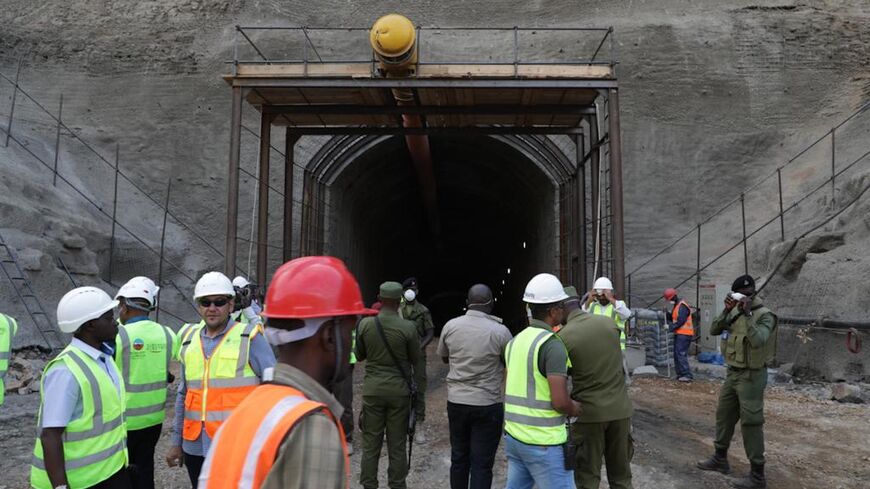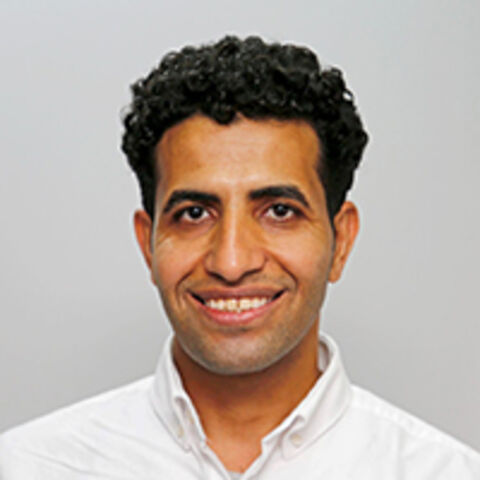CAIRO — A consortium of Egyptian companies building the Julius Nyerere dam in Tanzania has completed pouring the concrete for the main dam. Egypt’s Minister of Housing, Utilities and Urban Communities Assem el-Gazzar announced the progress Aug. 28 during his visit to Dar es Salaam.
Gazzar was leading an Egyptian delegation that included Egypt’s ambassador to Tanzania Mohamed Abu al-Wafa and a number of other officials. They first met with Tanzanian Minister of Energy January Makamba, who praised Egypt and President Abdel Fattah al-Sisi for their interest in the project.
Gazzar stressed that Sisi has a great deal of interest in the dam, saying he believes it will greatly contribute to Tanzania's development.
The project has faced various obstacles since it was launched in late 2018.
Mohammed Soliman, a nonresident scholar at the Middle East Institute, told Al-Monitor, “Egypt aspires to emerge as an alternative model for Africa. Egypt is a rising actor on the continent in sectors including infrastructure, pharma, logistics, aviation and defense.” He went on, “Owing to its success in Tanzania, Cairo is gradually becoming a reliable partner for other African nations such as Kenya, Ghana and Nigeria.”
In December 2018, an Egyptian joint venture that includes Arab Contractors and El Sewedy Electric Company signed a $2.9 billion contract in Dar es Salaam to build the Julius Nyerere dam and the hydropower station attached to it to generate power and control flooding on the Rufiji River. The station is expected to generate 6,307 megawatt-hours per year.
During his Aug. 28 visit to the dam site, Gazzar explained that construction of the dam's gates is currently underway and that the Egyptian joint venture has completed connection with the Tanzanian national electrical grid.
“We have come a long way in implementing the project,” project director Ayman Attia said in televised statements on Aug. 29. “We have finished building half of the dam’s body, and work is currently underway to install the gates. Once the parts for the electric turbines supplied from abroad arrive, they will be installed,” Attia explained.
He said that the project conveys a message to other African countries that Egyptian companies are capable of implementing such huge projects. He added, “It conveys another message to Africans: that the Egyptian companies … also train African citizens. We are Africans and we work with our African brothers; this is a privilege for us.” He noted that 11,000 of the project's 12,000 workers are Tanzanian.
The dam project had been planned to be completed at the end of this year, but its opening was postponed until 2024 due to a number of challenges, including disruptions in the delivery of vital building materials due to the coronavirus pandemic.
The Tanzanian government is determined to finish the project as soon as possible and begin exporting electricity to neighboring countries.
On a field tour to the dam site on Aug. 9, Makamba announced, “By July 2022 the project was 67.18% complete, compared to 37.4% between December 2018 and June 2021.”
Amani al-Taweel, director of the Africa program at Al-Ahram Center for Political and Strategic Studies, told Al-Monitor that Egypt is seeking to promptly finish the construction of the dam after postponing it so as to portray itself as a successful builder of dams and prove that it is not against development, as Ethiopia claims.
Since 2011, Ethiopia has been building a massive dam on the Blue Nile, the Grand Ethiopian Renaissance Dam, with the aim of producing 5,000 megawatt-hours of electricity per year that could be sold to neighboring countries in the Nile Basin.
Moatamer Amin, a researcher in international relations at the British University in Egypt, told Al-Monitor in reference to Ethiopia that “Egypt is helping East and Central African countries generate electricity and be self-sufficient to prevent any competitors from exporting electricity to these countries.”
He added that the Tanzanian dam project is part of a long-term Egyptian strategy of linking its interests with the Nile Basin countries in Central and East Africa through building and maintaining dams and a larger project to create a navigation lane linking Lake Victoria and the Mediterranean Sea via the Nile River.
Amin said, “Egypt is seeking to form an African group of Nile Basin countries that would serve as a unified bloc.”
Since Sisi came to power in 2014, Egypt has worked to regain the influence it had lost in the Nile Basin region, bolster its image and protect its water interests in the face of the GERD project. Egypt and Sudan have been engaged in negotiations with Ethiopia for more than a decade now on the operation and filling of the GERD, which Egypt considers a threat to its water security.
Negotiations between the three countries have been deadlocked since they failed to reach an agreement during the last round of talks held in Kinshasa in April 2021.
In mid-August, Ethiopia announced the completion of the third-stage filling of the GERD reservoir while ignoring Egypt and Sudan's repeated demands that the filling of the dam be halted until a legally binding agreement is reached.
On Aug. 29, Ethiopian Ambassador to Khartoum Yebeltal Amiru announced that his country was ready to resume negotiations on the GERD under the auspices of the African Union, but Taweel said, “The Ethiopian discourse lacks any real content capable of tempting Egypt and Sudan to resume negotiations.”
“At a time when the Egyptian position is plagued with uncertainty, President Sisi always states that Egypt’s waters are safe and that no one can approach them. However, he always falls short of explaining the mechanisms to protect this water. This issue seems restricted to Egyptian decision-making circles,” she went on.
Solima said, “Given the Ukraine war and the rising tensions in the South China Sea, the Nile dispute is not a priority for global powers. And at this point, and without international mediation, the likelihood of a water-sharing agreement is low.”








